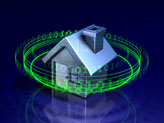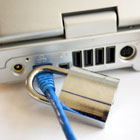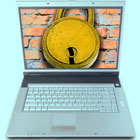How to Increase Your Wireless Home Network's Security
 Wireless home networks can have ranges of about 300 feet in normal conditions. This means that if you live in an apartment complex, several of your neighbors can jump onto your network. The same is true even if you live in your own home but have neighbors. You also have to worry about people breaking into your system, which might lead to bad things happening to your own computer. Wireless home networks can have ranges of about 300 feet in normal conditions. This means that if you live in an apartment complex, several of your neighbors can jump onto your network. The same is true even if you live in your own home but have neighbors. You also have to worry about people breaking into your system, which might lead to bad things happening to your own computer.
In addition, with homemade "cantennas" (usually made from potato-chip cans), hackers and other malicious users can access your wireless network from a greater distance–a few miles away in some cases. This isn't good news for you, the home Internet user who just wants the ability to use a laptop in any room of the house.
Secure Your Wireless Network
Fortunately, you can do several things to secure your wireless network. All of these security measures are easy to set up and will help create a safe environment for your Internet surfing.
Never use default usernames or passwords. As the owner of the home wireless network, you are the administrator. Your default username is probably "admin." Don't use that username–pick something else and use a combination of numbers and letters for your password. Change the password on a fairly regular basis for increased protection.
 Use MAC (Media Address Control) filtering. This option allows you to specify exactly which devices (your laptop, your kid's laptop, whatever) can access your network. If a device doesn't have the right address, then access is denied. Use MAC (Media Address Control) filtering. This option allows you to specify exactly which devices (your laptop, your kid's laptop, whatever) can access your network. If a device doesn't have the right address, then access is denied.
Shut down the network when you aren't going to be online for a while. You can simply turn off your wireless router (or wireless access point) when you're going to be on vacation or just a weekend-long road trip. If you just disconnect from your service provider's connection, you are protected from hackers from the Internet and from people accessing your Internet connection through your WiFi network. By turning off your wireless access point, you prevent anyone from accessing your network, including any computers that may have been left on.
Position the router to minimize signal strength outside of your house. You can move the router around and play with the antenna to decrease the coverage area. One of the best places to put your router is near the center of the house. You should also keep it away from windows.
Enable WPA / WEP Encryption
Use your system's encryption, such as WPA (Wi-Fi Protected Access) or WEP (Wired Equivalent Privacy). Your router or access point should come with a setup guide or manual to help you figure out how to enable security encryption on your network. If you have the choice between WEP and WPA encryption, choose WPA, since WEP is vulnerable to commonly available software programs that can crack the password in just a few minutes. Change the keys on a regular basis to make unauthorized access more difficult.
You should also disable your network's identifier broadcasting, the Service Set Identifier (SSID). When the SSID broadcast is disabled, your network stops advertising itself to the free world. What other people cannot see, they cannot try to access.
Use Firewall, Antivirus and Antispyware Software
 In addition to protect your home systems you should enable, and regularly update, your "usual" lines of defense. Your antivirus should be updated as often as possible. You should use your firewall any time that you're online (which, if you're running a high-speed connection, is basically any time that your computer is turned on). You should also run your spyware and adware removal tools once or twice a month at the least. In addition to protect your home systems you should enable, and regularly update, your "usual" lines of defense. Your antivirus should be updated as often as possible. You should use your firewall any time that you're online (which, if you're running a high-speed connection, is basically any time that your computer is turned on). You should also run your spyware and adware removal tools once or twice a month at the least.
None of these security tips are 100 percent foolproof. A very determined person might still be able to access your network.
However, when you use these security measures together, you're building a much stronger network. The more security you put into place, the tougher your network will be.
And the stronger the network, the less interested outside, unauthorized users will be in trying to break in. They will go for somebody else's unsecured network, leaving you to surf and work in peace.
Compare Internet Providers: Dial Up - DSL - Cable - Satellite - Wireless - VOIP
More Articles and Information:
|